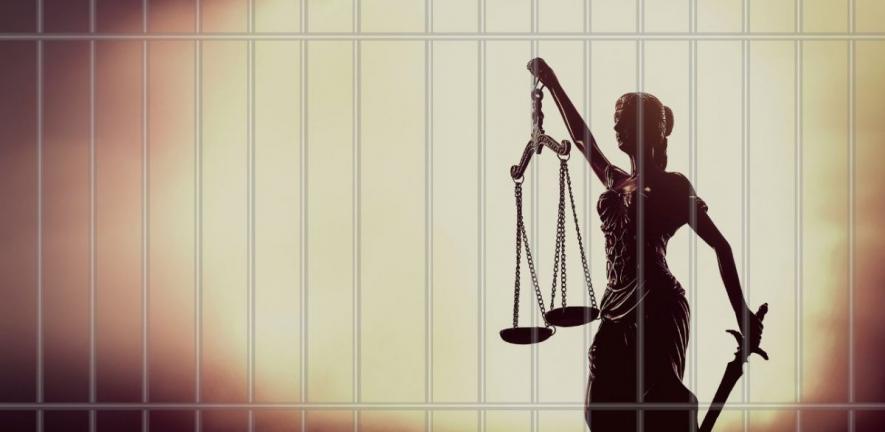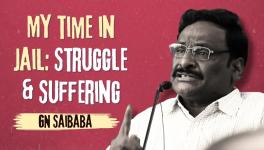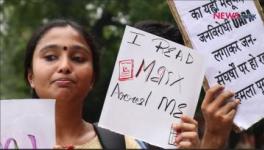Staying Bail Order, Especially in UAPA Case Where Getting it is Tough, is Travesty of Justice

क़फस उदास है यारों सबा से कुछ तो कहो
कहीं तो बहरे-खुदा आज ज़िक्र-ए-यार चले
- Faiz Ahmad Faiz
My wounded heart often heals itself in the comfort of poetry.
No, I am not only talking about heartbreak from a lover; in today’s time, the world has given many reasons to be heartbroken— one of them being the unjust incarceration of many.
On January 5, 2024, the Supreme Court Bench of Justices M.M. Sundresh and S.V.N Bhatti granted an extension to the stay on the bail granted to Gautam Navlakha by the Bombay High Court.
Navlakha is an accused in the Bhima Koregaon–Elgar Parishad Maoist links and criminal conspiracy case and is charged under the Unlawful Activities (Prevention) Act, 1967 (UAPA).
The Bench directed the Supreme Court registry to place the matter before the Chief Justice of India to decide the National Investigation Agency (NIA)’s plea to tag the petition with the cases of certain co-accused.
What led to this Order?
Navlakha, a human rights activist and journalist, was granted bail on December 19, 2023, after being incarcerated for approximately four years.
The high court granted him bail after taking into consideration the totality of the entire material and evidence on record against him produced by the NIA.
In its Order, the high court noted that at the most it can be said that Navlakha is a member of the Communist Party of India (Maoist) and therefore his case would attract provisions of Section 13 (punishment for unlawful activities) and Section 38 (offence for membership in a terrorist organisation) of the UAPA.
The latter prescribes a punishment of up to ten years and if there is a delay in the trial, the conditions under Section 43D(5) are diluted, as held in Union of India versus K.A. Najeeb, 2021.
The conditions of Section 43D(5) of the UAPA only apply to offences under Chapter IV and V, and Section 13 falls under Chapter III of the UAPA.
The Bombay High Court did not find any material on record to indicate that there are reasonable grounds for believing that the accusation against Navlakha under Sections 16 (punishment for terrorist act), 17 (punishment for raising funds for terrorist act), 18 (punishment for conspiracy), 20 (punishment for being a member of a terrorist organisation) and 39 (offence for support given to a terrorist organisation) of the UAPA are prima facie true and hence he was entitled to be released on bail.
Interestingly, after recording these findings, (Navlakha at present is under house arrest owing to ill health), the high court stayed the operation of the bail Order for three weeks on a request of the National Investigation Agency(NIA) to enable it to challenge the bail Order before the Supreme Court.
This request was acquiesced by the high court considering that Navlakha is in jail for more than three years and eight months.
This was not the first instance where the Bombay High Court had stayed the operation of bail after granting it.
On September 21, 2023, while granting bail to co-accused Mahesh Raut, a land and forest rights activist, in the same case as Navlakha, the high court stayed the bail Order and an appeal against the Order is pending in the Supreme Court.
The Supreme Court has extended the stay of operation of the bail Order and Mahesh, despite having a bail Order on merit to his credit, continues to languish in jail.
The Bombay High Court has fallen back on Section 482 of the Code of Criminal Procedure, 1973 (CrPC) for staying the operation of the bail Orders granted by it.
Section 482 reads as follows: “Saving of inherent power of high court— Nothing in this Code shall be deemed to limit or affect the inherent powers of the high court to make such Orders as may be necessary to give effect to any Order under this Code, or to prevent abuse of the process of any court or otherwise to secure the ends of justice.”
The principles governing the inherent jurisdiction of the high courts under Section 482 of the CrPC have been laid down by the Supreme Court in Madhu Limaye versus the State of Maharashtra, 1977.
The court has observed that the inherent power under Section 482 must be invoked to prevent abuse of process of any court or otherwise to secure ends of justice.
It must not be used if a specific provision for redress of grievances is provided or there is no other provision in the Code for the redress of a grievance and in similar other situations.
Further, it has been held that though the inherent jurisdiction is very wide, it has to be exercised sparingly, carefully and with caution and only when such exercise is justified by the tests specifically laid down in the Section itself.
It is to be exercised ex debito justitiae (from a debt of justice) to do real and substantial justice for the administration of which alone courts exist.
This principle was observed and upheld in R.P Kapur versus State of Punjab, 1960, State of Punjab versus Kasturi Lal & Ors, 2004 and Dr Monica Kumar & Anr versus State of Uttar Pradesh & Ors, 2008.
Idiosyncrasy of the Bombay High Court
The practice of staying its own bail Order is peculiar to Maharashtra, according to Justice Madan B. Lokur, former judge of the Supreme Court.
In 2021, the Bombay High Court, while observing that the trial court does not have the power to stay its own bail Order, held that such power resides only with the high courts under Section 482 of the CrPC and the court can exercise its power when it finds it necessary to prevent abuse of process of court or to meet the ends of justice.
Contrastingly, the same Bombay High Court in 1993 in C.P. Nangia versus Omprakash Aggarwal & Anr, 1993, observed that trial courts have powers to stay the operation of their own bail Order for good reasons and in the interest of justice.
According to C.P. Nangia, good reasons would include the difficulty of the prosecution to approach higher courts and deal with the accused when bail is granted, as the person may become scarce.
Although there is a lack of clarity about the power of the trial courts to stay their own bail, the latest position in Maharashtra is that the high court can exercise the power under Section 482 of the CrPC to stay the operation of the bail Order to give the prosecution an opportunity to approach the higher forum.
Though Section 482 of the CrPC is very wide, it remains to be seen whether it envisages a situation where an accused who has been granted bail on merits will not be allowed to walk out of jail because the prosecution must get an opportunity to appeal against the bail Order.
Recourse to Section 482 of the CrPC for grant of stay of a bail Order is arbitrary and goes against the spirit of Article 21 of the Indian Constitution.
The Supreme Court has time and again stated that bail is the rule and jail is the exception and that arrest is a draconian measure resulting in curtailment of liberty.
The purpose of bail is to secure the appearance of the accused person at his trial by a reasonable amount of bail, as laid down in Satender Kumar versus Central Bureau of Investigation, 2022.
It is an extremely strenuous task to obtain bail under the UAPA as Section Section 43D(5) of the Act prescribes a bar on the grant of bail.
While granting bail under the UAPA, the judge has to form an opinion if a prima facie case is made or not against the accused based on the police report or case diary only.
It is undeniable that the application of the UAPA has increased over the past few years and individuals are kept in jail for years awaiting bail, trial, or sometimes both.
A 2023 National Crime Records Bureau (NCRB) report showed a 23 percent rise in UAPA cases.
From personal experience as a counsel, I can report that it is after a long legal battle that an accused person gets bail under the UAPA and when they finally manage to get bail, it is very unfortunate that it is stayed by the same court which granted them bail.
This unjustified curtailment of liberty has a direct bearing on citizens’ right to life and liberty as granted by Article 19 and Article 21 of the Indian Constitution.
I argue that recourse to Section 482 of the CrPC to meet the ends of justice or prevent abuse of the process of court cannot be taken to prevent an accused person from being released on bail after she has been granted bail.
It has been observed that the power under Section 482 of the CrPC has to be exercised sparingly and with circumspection and in the rarest of rare cases, and anxiety of an investigating agency that the accused may become scarce after being released on bail does not fall in the category of rarest of rare cases.
It is the right of the prosecution to prefer an appeal against the bail Order; at the same time, it is the right of the accused person to be released from jail after she furnishes the surety and fulfils other conditions as necessitated by the Order granting her bail.
Since bail is ultimately a temporary release and a trial has to be conducted eventually, if a bail Order is perverse, the Supreme Court can reverse it.
The inherent jurisdiction exists to meet the ends of justice as has been observed by the Supreme Court and it must not be used simply for the convenience of the prosecuting agency.
It has been observed that the inherent power of the high court cannot be invoked in matters that are directly covered by specific provisions in the CrPC.
Since provisions for appeal against bail Orders exist in the CrPC as well as the National Investigation Agency Act, 2008, granting of stay by the high courts to enable the prosecution to appeal against it is arbitrary and illegal.
The Supreme Court has observed in Manoranjan Rout versus State of Odisha, 2023: “When a court concludes that the accused is entitled to be enlarged on bail pending trial, granting bail only for a limited duration is illegal. Such Orders violate the right to liberty under Article 21 of the Constitution of India.
“Moreover, it puts an additional burden on the litigant as he is forced to file a fresh bail application for an extension of the bail granted earlier.”
The spirit of this Order can be read into the practice of staying bail by the Bombay High Court and it can be safely argued that such a stay is illegal as it unjustly deprives a person of their liberty.
Furthermore, it puts an additional burden on the accused to re-argue the Order granting them bail without actually being released on bail.
The Supreme Court had refused to interfere with the bail granted to another co-accused Anand Teltumbde by the Bombay High Court and later it granted bail to two other co-accused Vernon Gonsalves and Arun Ferreira.
The other bail petitions are still pending before the Supreme Court and must be decided expeditiously, and the court must also deprecate the practice of stay being granted on bail Orders because one must remember that bail is the rule and jail is an exception and no one can be deprived of his life or personal liberty except according to a procedure established by law.
Deeksha Dwivedi is a New Delhi-based criminal lawyer. In her free time, she likes to paint, read poetry and spend time with her cats.
Get the latest reports & analysis with people's perspective on Protests, movements & deep analytical videos, discussions of the current affairs in your Telegram app. Subscribe to NewsClick's Telegram channel & get Real-Time updates on stories, as they get published on our website.
























